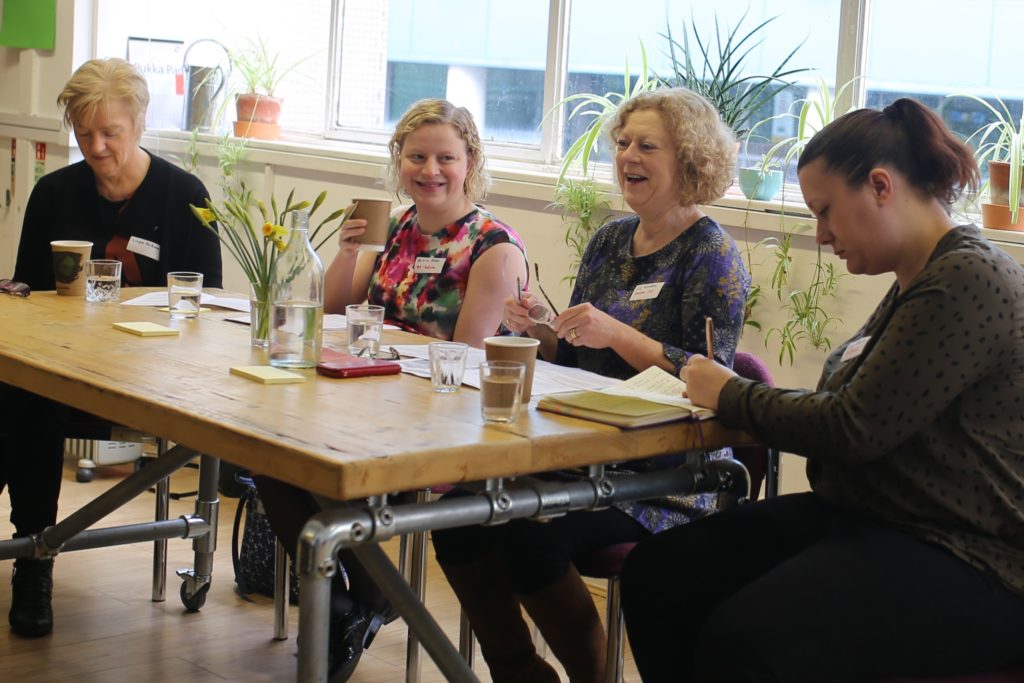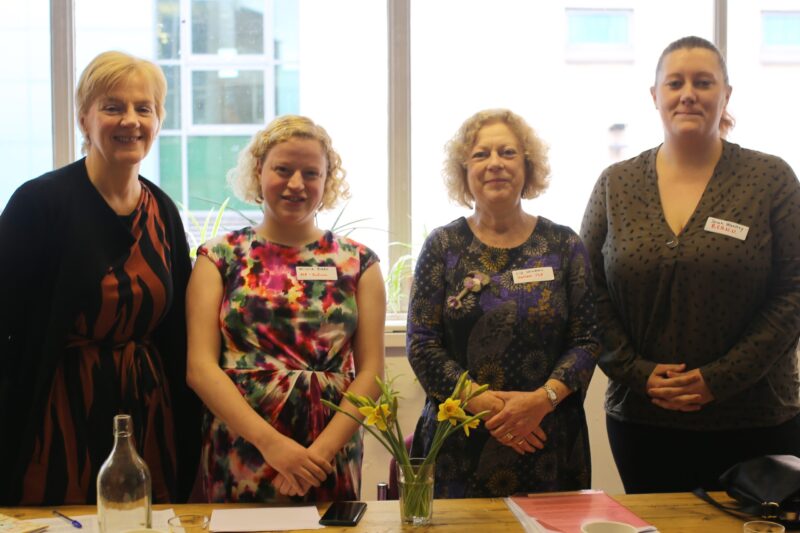

Sheffield Hallam Labour Party organised a half day event to celebrate International Women’s Day on Saturday March 7th 2020 at the Union Street co-working space in Sheffield city centre.
The event was centred on the theme of ‘Women and the Economy’ and involved speakers, discussion, and the opportunity for wider networking.
Over 30 people attended including Labour party members from Sheffield Hallam and other Sheffield CLPs and some non LP members.
A vegetarian was lunch was provided after the event by the local voluntary organisation Foodworks (https://thefoodworks.org/).
MEETING REPORT
Introduction: Liz Winders CLP Chair
The Chair explained that this was the third IWD event the CLP had organised. We do this because we are committed to celebrating IWD as part of our socialist-feminist principles and also because we need to be aware that there are still major gender inequalities in the world today. Examples include:
- The recently reported decline in life expectancy among poorer women in the UK;
- reports of denials of epidurals to women in labour;
- The continuing gender pay gap – UCU strikes took place in the three weeks preceding IWD20 and will continue in the following week;
- The ‘me too’ movement and the sexual harassment that many women experience, particularly those working in precarious employment in bars etc.
IWD was started in 1910 by Clara Zetkin, a leader of the SPD (Social-Democratic Party) in Germany. It was developed to celebrate the struggles of women workers for the right to vote and for equal employment and social rights. It is about how the labour movement can improve the collective situation of women.
We have picked the theme of ‘Women and the Economy’ for this year because we thought it important to look at the economic inequalities facing women world-wide, growing poverty among women workers in precarious employment and on universal credit and how trade unions and the labour movement can respond to these inequalities. We welcome suggestions for themes for future years. The Chair then introduced the three speakers.
Olivia Blake, MP for Sheffield Hallam
Olivia informed the audience that IWD is now celebrated in Parliament every year with an open debate. Sometimes the emphasis is very much on women in positions of power. It is important to remember the radical origins of IWD, including women in 1909 struggling for equal pay and the right to vote. In Russia in 1917 women workers took strike action which led to the abdication of the Tsar. Women workers have been involved in major working class struggles such as the Bryant and May Matchmakers in 1888, and the Ford Dagenham machinists in 1968. The latter dispute led to the passing of the Equal Pay Act (1970). Today in some parts of the world women have formal equality, but there are still real inequalities, such as the gender pay gap. The International Labour Organisation estimates the gender pay gap as around 20%. From 14th November to the end of each year, comparing men’s and women’s pay, women are effectively working for free. Other important inequalities are the extensive occupational segregation by sex and the large amount of unpaid domestic and caring work done by women. Oxfam reports show that the 22 richest men in the world earn more than the entire female population of Africa. Austerity policies have hit women particularly hard. The climate catastrophe will harm women in drought zones, since they will walk further to collect food and water. The Labour proposal for a Green New Deal could do much to create well-paid unionised jobs.
Linda McAvan OBE
Linda congratulated Olivia on being elected an MP. She also spoke about some former women MPs who had lost their seats in 2019. The situation of many women in the UK has improved since the days of our grandmothers and mothers. Linda spoke about family members who had worked in the mills in Bradford. Trade unions had done much to improve their situation. There was a time when women workers did not have equal pay and had no access to the pension scheme. European Union law on Equal Pay for Work of Equal Value had been important too.
Linda then spoke about the situation of women globally. A Labour Government had been responsible for removing the issue of International Development from the Foreign Office. There is a need to be aware of the danger of international development funding being treated by the Conservatives simply as an aspect of foreign policy, rather than delivering genuine aid. She spoke about a visit to Africa with Glenys Kinnock. In parts of Africa maternal mortality and morbidity is high, with one woman dying every two minutes in childbirth and 20-30 women suffering lifelong complications. Linda mentioned a visit to the fistula clinic in Addis Ababa, where (often very young) women can receive surgery to repair damage caused by childbirth. Women’s reproductive rights are under threat from the current US administration.
Another major issue is violence against women. In 2018 the Nobel Peace Prize was awarded to two campaigners against violence against women. Dr Denis Mukwege had investigated the rape of women and children which occurred as part of the Rwanda genocide. Nadia Murad, a Yazidi woman, had spoken out about the sexual slavery imposed by Islamic State in areas they conquered.
Linda also told the audience about a visit to Kenya. She found that climate change was leading to greater poverty among farmers. Some families were responding to this situation by marrying their daughters earlier to gain the bride price. This meant young women were being married younger than they wished and losing their education.
Lastly Linda spoke about the impact of Brexit on the UK and the need to preserve women’s and workers’ rights. The UK Government has refused to align with EU standards, so this has implications for employment protection.
Sarah Woolley, General Secretary Elect BFAWU (Bakers, Food and Allied Workers Union)
Sarah spoke about the importance of environmental issues. She also referred to violence against women and the need for more awareness of the issue. Too many people see unions as a third party rather than thinking of themselves as part of the union. Workers at MacDonalds have achieved a large pay rise as a result of union organising. Also, two managers have been dismissed for bullying and harassment after the union raised the issue. Workers can experience harassment from managers as well as customers. There can be challenges in getting women to speak of their experiences of harassment. Too often the victim is made to feel that they are to blame or they feel embarrassed. Sometimes unions need to tackle bullying and harassment within unions as well. We cannot challenge employers and managers so easily if we have not put our own house in order. Issues like harassment are now more often discussed at union conferences.
RMT cleaners are going to receive the Living Wage as a result of union efforts. Unions need to talk about the gender pay gap more.
Sarah spoke about her work as a union official. She became a full-time union official at the age of 28, as a result of support and encouragement from fellow workers. She was also encouraged by other members of the union to stand for election as General Secretary. Not all women receive support and encouragement to take on union roles. Yorkshire and Humber TUC has a network for women union officials. This has been helpful. Sometimes union members do not see women as experts and women have to work hard to become accepted in official roles.
QUESTIONS AND DISCUSSION
Questions were written out in the break and then grouped into sets by the Chair. Questions covered many areas, including:
- Collective action and organising;
- Issues which disproportionately affect women;
- Violence against women;
- Women’s participation and health in the workplace, including flexible working and the menopause;
- Resilience, promoting equality and involving men in gender equality struggles.
The speakers responded to these questions. Sarah explained how BFAWU is training its union reps to deal with cases of harassment and rape. BFAWU is working with Sheffield Trades Union Council and SNAP (Sheffield Needs a Pay Rise). Linda spoke about the need for more women candidates for Council elections. Olivia talked about how the movement under Universal Credit to one payment per house disadvantaged those women trying to escape from domestic violence. Linda also spoke about the crisis in social care and the case for better pay for care staff. Social care should be part of the health service. Speakers spoke about support for women facing problems at the time of the menopause. In some workplaces polyester uniforms have been replaced with cotton ones. Lastly the speakers talked about the importance of self-care and care for others to get through difficult times.
Suggestions for themes for IWD meeting for next year
Please send these to Liz Winders, CLP Chair, [email protected].
Biographical Notes on Speakers
Olivia Blake MP: Olivia Blake was elected as MP for Sheffield Hallam in the 2019 General Election. She is the first female MP to be elected for Sheffield Hallam. Olivia currently serves as Shadow Parliamentary Private Secretary (PPS) for Transport and is a member of the Public Accounts Committee. From May 2014 Olivia served as a Labour Councillor for Walkley. She studied Biomedical Science at the University of Sheffield, where as a trade union activist she was involved in organising to improve pay of low-paid workers.
Linda McAvan OBE: Linda McAvan OBE was MEP for Yorkshire and the Humber from 1998 to 2019. From 2014 to 2019 she chaired the European Parliament Committee on Development. During her time in the European Parliament she worked on many issues, including the UN 2030 Sustainable Development Agenda, education for refugee children, fair trade, climate action and the rights of women and girls. Linda is currently Executive Director for European Relations of the European Climate Foundation.
Sarah Woolley: Sarah Woolley has been elected as General Secretary for the Bakers, Food and Allied Workers Union (BFAWU) and takes up office from 1st July 2020; she will be the first female to hold the role. She is currently Organising Regional Secretary for BFAWU for North East England and Scotland. Sarah has represented BFAWU on the GFTU (General Federation of Trade Unions), where she has served on the Finance and General Purposes Committee.

